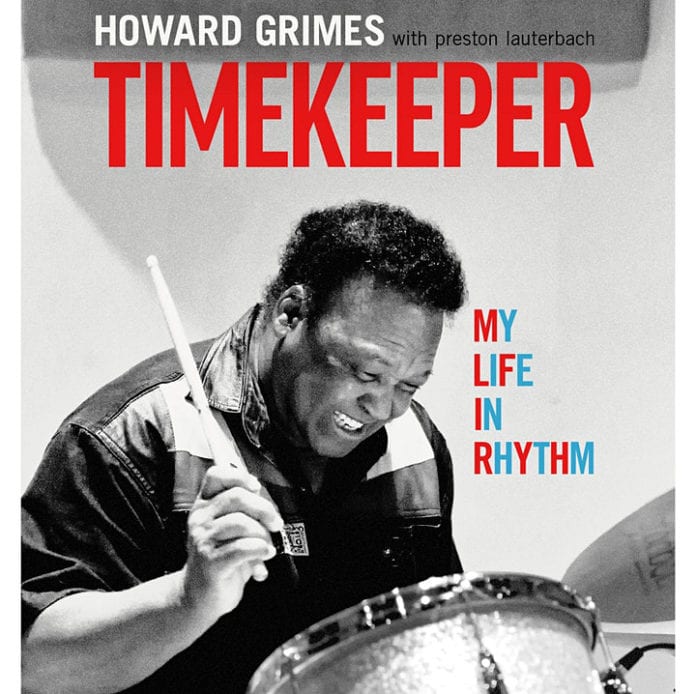by Phyllis Dixon —
Memphis has a rich musical heritage, with local icons such as Rufus Thomas, Al Green, Isaac Hayes, Booker T. Jones, Stax and Hi Records known worldwide.
Drummer Howard Grimes is probably not on that list, but should be.
“Timekeeper – My Life in Rhythm,” is his story. It is a gritty, unapologetic tale that doesn’t hold back – like Memphis, the city he was born and raised in.
The city where he reached professional heights, which included playing drums on million-selling records, performing at Carnegie Hall and on “American Bandstand.”
And, the city where he was homeless, living in his car.
But also, like Memphis, it is a story of faith, perseverance and redemption.
Howard Grimes was born in 1941. He is the oldest of nine children and recalls growing up in a close-knit North Memphis neighborhood that is now Interstate 40-240.
He attended Manassas High School, where he and Isaac Hayes were in the same homeroom and marching band.
He began playing in clubs in the 1950s while barely a teen, and his Beale Street descriptions transport the reader back in time.
He was at Stax, before it was Stax, playing on Carla Thomas’ first hit on Satellite Records, as it was known then, and Stax hits by Sam and Dave, William Bell and Booker T and the MGs.
He became part of the band at Hi Records, collaborating with producer Willie Mitchell and playing on almost all of Al Green’s hits.
His playing and professionalism were highly regarded in the industry, and he played with artists not usually associated with Memphis, such as Jackie Wilson, Marvin Gaye and Cyndi Lauper.
In 1967, while touring with pop-rock band, Paul Revere and the Raiders, a sold-out show in Montgomery, Alabama was almost cancelled when the coliseum owner refused to let a “n—-r” on stage.
The rest of the group (Grimes was the only Black band member) refused to play, if Grimes wasn’t allowed to play.
He even played for blues pioneer Ma Rainey in the waning days of her career.
“Timekeeper” includes plenty of name dropping, from details of Al Green’s “grits” episode, to who was so drunk they could barely stand on stage.
Grimes was no angel, but compared to some of the other goings on, he was a boy scout.
His desire to avoid the drama and concentrate on music was admirable, but he feels not hanging out cost him in dollars and recognition. He wasn’t in the clique and missed several opportunities.
While his contemporaries received writing credits and lucrative recording deals, Grimes was paid by the session, mostly whatever they wanted to give him, often not even union scale.
His story is matter of fact and not a “woe is me” tale.
He said, “As the drummer, it wasn’t my job to be out front; I needed to hang back.”
He was the timekeeper.
His tone is not bitter. He said he “simply didn’t know the business.”
In discussing his personal life, he doesn’t sugarcoat the details.
Sometimes he was living the heartache in the hits he was playing like Denise LaSalle’s “Trapped By a Thing Called Love” and Ann Peebles’ “I Can’t Stand the Rain.”
“Timekeeper” will appeal to anyone interested in the evolution of popular music in general, and Memphis soul music in particular.
Some descriptions are very technical and may be unfamiliar to a non-musician.
Also, the book could benefit from an index.
The book reads like a conversation and credit award-winning co-writer Preston Lauterbach (“Beale Street Dynasty,” “The Chitlin’ Circuit” and the “Road to Rock and Roll”) for vividly recording Grimes’ story. Because it is like a conversation, some portions are raw, but that adds to the story’s authenticity.
Howard Grimes experienced dream-come-true high and nightmarish lows. But through it all, he was a man of faith, and that faith has sustained him.
While others earned more money and fame, Howard Grimes has his health and has lived to tell the story, and hopefully receive long overdue recognition.
It’s time to give the drummer some.
(Phyllis Dixon is the author of Reader’s Corner, a periodic column in The New Tri-State Defender featuring her take on reading, books and authors. June is African American Music Appreciation Month and this column kicks off the TSD’s monthlong focus.)



